‘Nothing Has Changed’ for Public Option
Press secretary Robert Gibbs called the media's determination that the president had abandoned the public option "one of the more curious things I've ever seen in my life." Is this a case of spin or spine? Read Gibbs' entertaining back-and-forth with reporters (full text after the jump) and come to your own conclusion.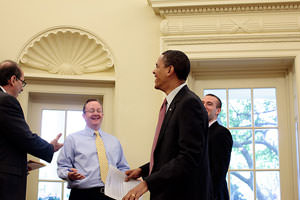
Press secretary Robert Gibbs called the media’s determination that the president had abandoned the public option “one of the more curious things I’ve ever seen in my life.” Is this a case of spin or spine? Read Gibbs’ entertaining back-and-forth with reporters (full text after the jump) and come to your own conclusion.
Gibbs’ claim isn’t particularly comforting, even if you take him at his word. He’s saying the president has always preferred a public option — and has always been willing to cave, if necessary.
The press secretary made similar comments at a briefing — video here. — PS
Your support matters…The White House:
PRESS GAGGLE BY PRESS SECRETARY ROBERT GIBBS
Aboard Air Force One En route Andrews Air Force Base
4:50 P.M. EDT
MR. GIBBS: Good morning.
Q Morning?
MR. GIBBS: I know, it’s not really morning. I’m pretty sure my schedule will be completely messed up by the time we get home.
Q Public option — is it dead or not?
MR. GIBBS: I got to tell you, this is one of the more curious things I’ve ever seen in my life. I was on a Sunday show, I said the same thing about a public option that I’ve said for I don’t know how many weeks. The Secretary reiterated what the President said the day before, and you’d think there was some new policy.
Q The language appeared to be —
MR. GIBBS: The language “appeared” to be?
Q Well, the language on Saturday — the President made — saying that the public option was only a sliver, and whether it’s in it or it isn’t in it seems to move the ball a little bit from where you guys were. No?
MR. GIBBS: No. I think you can go back and find the President saying — look, the President has said that’s his preference, but the President has also said I don’t know how many times if the goals are choice and competition, right, the reason you have a public option is because you have an insurance market that doesn’t have choice or competition. If somebody is trying to seek private insurance on — private health insurance on a private market and only has — because this happens in some areas or in some states where there’s one insurance company that does business in that region, that that is — that doesn’t ensure the type of affordability and quality that you’d want to see in a health insurance system.
So you have some competition that provides some choice, so that if a family of four might have different insurance needs than a single person or a couple that’s married with no children or what have you. The goals are choice and competition. His preference is a public option. If there are other ideas, he’s happy to look at them. Because I think his — I think this is true not only for the issue of health care, but for virtually every other issue that he’ll ever deal with in public life is he has goals about what he wants to accomplish and he’s not necessarily wedded to one — only one way of getting there. I think he’s said that a hundred times.
Q Just to be completely clear, has anything changed on the public option?
MR. GIBBS: No. I challenge you guys all to go back and see what we’ve said about this over the course of many, many, many, many months, and you’ll find a boring consistency to our rhetoric.
Q The rhetoric, as you say, might be consistent, but the movement on the ground, so to speak, toward legislation hasn’t been. Is there any recognition now that a public option is looking less likely to be part of a final deal?
MR. GIBBS: Let me make sure I understand your question, because I want to know if it’s — is this predicated on legislative developments since Congress has been out of session, or are we trying to match the stampede of a series of stories to if not the consistent language that we’ve all been saying to some now legislative vote?
Q It’s just looking more and more likely that a public option is not going to be part of the final bill. I’m wondering if the White House is —
MR. GIBBS: I do think — can I just — I want to point out the — how do I phrase this — massive irony that I don’t know that I saw any of your stories denote the fact that this might be — that you’re surmising now this was a political reality rather than —
Q That’s what we’re asking.
MR. GIBBS: I understand, but did you think from the phrasing of Julianna’s question that we might be coming to justify a series of stampeding stories in one direction based on something different than what we’ve always said?
Q But you guys have — you haven’t exactly come out publicly since Sebelius’ statement yesterday, come in front of the cameras to speak to us, to downplay —
MR. GIBBS: Because nothing has changed.
Q But you haven’t downplayed the remarks and the coverage either.
MR. GIBBS: No, no, I think many people talked to you all yesterday. I think people sent e-mails. David Axelrod called people.
Q (Inaudible.)
MR. GIBBS: I didn’t get an e-mail from you. Nothing has changed. I mean, we can go out and say nothing has changed, but that seems sort of silly since nothing has changed.
Look, in terms of the political realities, obviously there’s a public plan — or public option in the House bill. There is a public option in the HELP bill. I don’t know what the Senate Finance Committee will come out with.
Q When the President talks about the special interests and railing against the special interests on health care, who is he referring to — criticized special interests, lobbyists, and —
MR. GIBBS: Well —
Q Specifically, those you’re referring to. What constituencies?
MR. GIBBS: Interest groups that are aligned to keep the status quo either because it benefits them or they have a vested interest in — or because they have a vested interest in it not changing.
Q So he would include drug makers in that, or not?
MR. GIBBS: Drug makers, if you’re a member of PhRMA, you’ve come to an agreement about health care reform happening this year.
Q So he’s referring to special interests who are not on board with reform?
MR. GIBBS: Well, I mean, to be critical of somebody who’s not for reform, you typically would have to be opposed to the President’s plan.
Q Right, but it seems that there are actually a lot of special interests that are in favor of reform. So —
MR. GIBBS: I guess I’m confused at where you’re heading here.
Q Well, I’m — he gets up there, he rails against special interests, but yet there are special interests who are allies of the White House, as well.
MR. GIBBS: But let’s be clear. You can rail against special interests that are for — it’d be sort of odd to go to a town hall meeting and rail against interest groups that are supporting reform — right — who have acknowledged that it’s time for health care reform; acknowledged that the system as we currently have it either isn’t working for patients or doctors or nurses or seniors or young people or budgets or the government.
Q Well, then, specifically, who? Can you give me a couple examples of —
MR. GIBBS: I think the President mentioned the other day that there are insurance companies that are for the status quo.
Q Like?
MR. GIBBS: Well, I think we’ve produced a list. I’ll try to find that for you. There’s groups that have run commercials, right? Dick Armey’s group has been out there. I’d point you to Dick Armey’s comments on Medicare today, as well. But Dick Armey’s group is out there actively getting people to go to town halls and yell at members of Congress. The Conservatives for Patients’ Rights, the gentleman who has in his list of lifetime accomplishments, “receiving the largest Medicare fine in the history of the entire program,” who spent millions of dollars to go on TV and criticize health care reform. I think that’s a list of people that are special interests who oppose a change and reform in health care.
Q Switching topics —
Q Wait, can I ask one more health care question?
Q Sure.
Q What was the President’s message to Chairman Baucus regarding the public option during their meetings on Friday?
MR. GIBBS: I don’t know the degree which that particularly came up. I think they were talking more about the global process, about trying to get consensus in the Finance Committee.
Q Would that have to involve public option of some sort?
MR. GIBBS: Well, I mean, obviously they’ll make a decision about it. He didn’t talk to me about whether or not that specifically came up.
Q Swapping topics a little bit to tomorrow. What does the President hope to achieve with his meeting with Mubarak?
MR. GIBBS: Look, again, I think this is continuing our outreach in the Middle East. Again, I don’t want to get ahead of what the President will tell Mubarak. But I think obviously each country in the region on either side of this issue has certain responsibilities to uphold as we make progress toward a lasting peace in the Middle East. And without a recognition of those responsibilities it’s going to be hard to move forward. So I think the President will take some time to talk through that.
Q Anything else specifically that he wants to discuss?
MR. GIBBS: Well, let me — let me just leave at that, then we’ll have — you guys will have a chance to talk to them tomorrow afternoon.
Q More broadly, sort of six months from sort of starting his Middle East peace push, how does the President feel things are sort of developing? It seems we’ve gone to a situation now where the Arabs are telling the Israelis, you’ve got to go first, and the Israelis are telling the Arabs, you’ve got to go first. Is there any way you can sort of unblock that situation?
MR. GIBBS: Well, look, I think — I think most Middle East observers will tell you that progress on this issue is not going to be made unless or until there’s sustained involvement by the United States; that if we look back at progress that has been made, it’s generally been with the involvement of the United States, because we all understand it’s in our national interest.
I think the President talked throughout — has talked throughout his time in public life as saying that most of all, what we have to have is have that sustained engagement that allows the two parties to work with each other and make progress. And without it, what happens, we tend to see — we tend to see the absence of that progress.
And I think instead of — instead of waiting until the end of a certain term or a certain time to have that engagement, the President’s plan is to — was to do that from the very beginning, and I think you saw that in the phone calls that he made the very first full day — his very first full day in office. We’ll continue to do that.
Q Has he spoken to Mubarak since the June meeting?
MR. GIBBS: I don’t believe he has but I will double-check. I don’t believe he has since then. They haven’t — I mean, they haven’t spoken on the phone, I should say.
Q How else —
MR. GIBBS: Well, they could communicate.
Q He’s got the e-mail address.
Q Yes.
MR. GIBBS: You could write a letter.
Q Does he have the BlackBerry —
Q Does he have the e-mail address?
MR. GIBBS: Not that I’m aware of, no. Just by letter.
Q So you’ll let us know if any communication has —
MR. GIBBS: Yes, well, I’ll double check with those guys.
Q Is there a change in the schedule for the rest of the week?
MR. GIBBS: Not that I’m aware of, though I have to admit, having been out West, I’m a bit out of the — I’m happily out of the scheduling loop for a couple days. But we’ll try to update you tomorrow morning or tomorrow afternoon in the briefing if any events have been added. I’m sure there have, just as they have been fleshed out.
Q And the reason that we moved the schedule up earlier today — was there any special reason?
MR. GIBBS: No, just he was — he was up a little earlier, and the VFW could take us a little earlier, and I think he’s probably anxious to get back over — to get back out East, much to our chagrin.
Q What’s the format for tomorrow, is it — with Mubarak? Is it the usual one-on-one, expanded delegations, lunch, that kind of thing?
MR. GIBBS: I believe so. I don’t — I have not seen the full itinerary, but I don’t know why that would be different. And then I don’t know where we’re doing the spray with the questions, but we’ll have all that information out for you guys either in tonight’s guidance or first thing tomorrow morning.
Q With the budget mid-session review coming out in the next few weeks, are you guys expecting good news or bad news?
MR. GIBBS: Well, look, I think obviously the biggest driver in a budget right now is the state of the economy. I think it’s pretty safe to assume that the economy over the course of the first six months, particularly that first three months that the President was in office, we’ve talked about numerous times deteriorated at a rapid pace unlike anything anybody imagined. So I think in many ways it has only sharpened our budget challenges. I’ve not seen the final documents or things like that, but I don’t think there’s any doubt the challenges remain to get our fiscal house in order.
I think you’ve heard the President at town hall meetings talk about the importance of making sure that health care reform is paid for. I think he, at the end of — particularly at the end of the Colorado town hall meeting, you know, he talked about, you know, Congress — and the President added an expensive drug benefit through Medicare that we didn’t pay for. We went to war in Iraq that we didn’t pay for. We made a lot of cognitive decisions that we knew would be expensive, and we made them knowing we weren’t going to pay for them.
The President has a different idea about that — that reform has to be something that we pay for because we have to get our fiscal house in order, we have to change the cost curve for Medicare and Medicaid. Families can’t afford health care to continue to skyrocket at this rate. Neither, quite frankly, can the government.
All right, enjoy your flight home. Thanks, guys.
Q Thanks, Robert.
END 5:05 P.M. EDT
Independent journalism is under threat and overshadowed by heavily funded mainstream media.
You can help level the playing field. Become a member.
Your tax-deductible contribution keeps us digging beneath the headlines to give you thought-provoking, investigative reporting and analysis that unearths what's really happening- without compromise.
Give today to support our courageous, independent journalists.

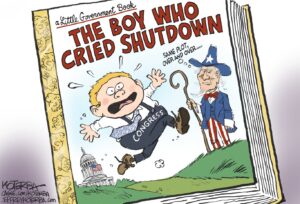
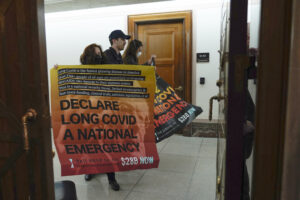

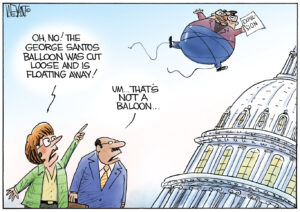
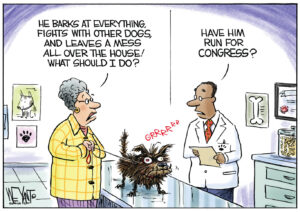
You need to be a supporter to comment.
There are currently no responses to this article.
Be the first to respond.